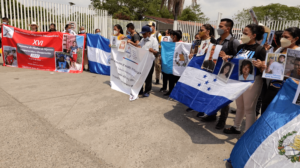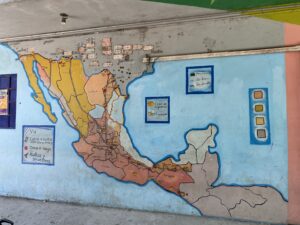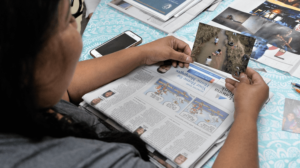Participantes en el proyecto
Desde una apuesta investigadora por el protagonismo de quienes viven en sus cuerpos la experiencia de la movilidad por rutas inseguras, este proyecto ha buscado la forma de ser una plataforma para su visibilización en los tres territorios claves. En total han participado en este trabajo 180 personas (143 mujeres y 37 hombres) en talleres o entrevistas, pero sobre todo, compartimento de vida.
En Honduras se ha trabajado con un total de 50 personas (40 mujeres y 10 hombres), vinculadas a organizaciones de búsqueda de familiares desaparecidos/as en la ruta o que acompañan el regreso ante situaciones de deportación o repatriación de cuerpos.
 Caravana de madres centroamericanas buscadoras de sus familiares. Mayo 2022
Caravana de madres centroamericanas buscadoras de sus familiares. Mayo 2022
En México han sido 115 las personas participantes (90 mujeres y 25 hombres) en diferentes puntos de la ruta. Así, se han realizado talleres, observaciones y entrevistas etnográficas en la ciudad de Tapachulas (Chiapas), en el Albergue de la 72 en Tenosique (Tabasco), en las ciudades de Oaxaca, Puebla y Tlaxcala en tanto que corredor clave para la trata de personas, la Ciudad de México por su importancia en cuanto a la desaparición de personas y organización de colectivos, los estados de Tamaulipas y Sinaloa por ser parte de dos de las rutas migratorias de mayor importancia (así como de desaparición de personas), y Monterrey (Nuevo León), Saltillo (Coahuila) o Tijuana (Baja California) por su ubicación fronteriza.

Mapa de México, ruta de cuidados. Albergue La 72 (Tenosique, Tab.) Octubre 2022
En Estados Unidos han participado 15 personas (13 mujeres y 2 hombres) en tanto territorio clave de llegada migratoria. Era de especial interés poder conocer cuáles son las violencias que se perpetúan en destino y ante las que las mujeres viajeras siguen ofreciendo resistencia y oportunidad de transformación.
 Taller con mujer hondureña residente en Madison (Wisconsin). Julio 2022
Taller con mujer hondureña residente en Madison (Wisconsin). Julio 2022

